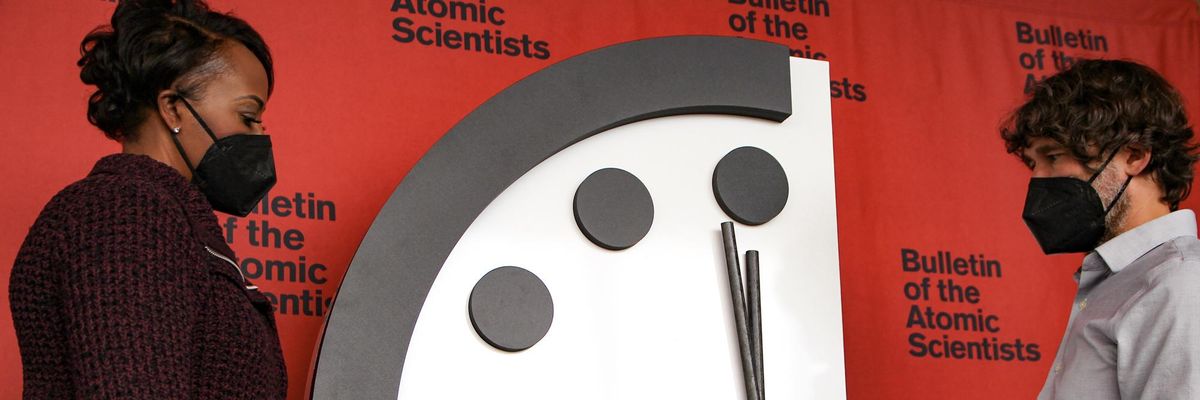Top scientists responsible for the "Doomsday Clock" issued a stark warning Thursday about how close the world is to catastrophe due to the climate emergency, nuclear weapons, and "disruptive technologies in other domains."
"The Doomsday Clock continues to hover dangerously, reminding us about how much work is needed to be done to ensure a safer and healthier planet."
Launched by the Bulletin of the Atomic Scientists in 1947 as a symbol for "how close we are to destroying our world," the clock remains at 100 seconds to midnight for the third year straight. The closer to midnight, the greater the risk of "civilization-ending apocalypse."
The clock is set each January by the bulletin's Science and Security Board (SASB) in consultation with its Board of Sponsors, which includes 13 Nobel laureates. They warned Thursday that humanity is "at doom's doorstep," which "is no place to loiter."
"100 seconds to midnight reflects the board's judgment that we are stuck in a perilous moment--one that brings neither stability nor security," said SASB co-chair and George Washington University professor Sharon Squassoni. "Positive developments in 2021 failed to counteract negative, long-term trends."
Rachel Bronson, the bulletin's president and CEO, made clear that the clock's current setting signals the need for immediate and globally coordinated action.
"The Doomsday Clock continues to hover dangerously, reminding us about how much work is needed to be done to ensure a safer and healthier planet," she said. "We must continue to push the hands of the clock away from midnight."
A lengthy statement authored by John Mecklin, the bulletin's editor-in-chief, details SASB's decision as well as steps that leaders can take to "move the world away from catastrophe."
"Last year's leadership change in the United States provided hope that what seemed like a global race toward catastrophe might be halted and--with renewed U.S. engagement--even reversed," the statement says, but the not-so-peaceful transfer of power from former President Donald Trump to President Joe Biden "was not enough to reverse negative international security trends that had been long in developing and continued across the threat horizon in 2021."
According to the bulletin:
U.S. relations with Russia and China remain tense, with all three countries engaged in an array of nuclear modernization and expansion efforts--including China's apparent large-scale program to increase its deployment of silo-based long-range nuclear missiles; the push by Russia, China, and the United States to develop hypersonic missiles; and the continued testing of anti-satellite weapons by many nations. If not restrained, these efforts could mark the start of a dangerous new nuclear arms race. Other nuclear concerns, including North Korea's unconstrained nuclear and missile expansion and the (as yet) unsuccessful attempts to revive the Iran nuclear deal contribute to growing dangers. Ukraine remains a potential flashpoint, and Russian troop deployments to the Ukrainian border heighten day-to-day tensions.
For many countries, a huge gap still exists between long-term greenhouse gas-reduction pledges and the near- and medium-term emission-reduction actions needed to achieve those goals. Although the new U.S. administration's quick return to the Paris agreement speaks the right words, it has yet to be matched with actionable policies.
The statement also points to the world's "entirely insufficient" response to the ongoing Covid-19 pandemic, highlighting that "plans for quick global distribution of vaccines essentially collapsed, leaving poorer countries largely unvaccinated and allowing new variants of the SARS-CoV-2 virus to gain an unwelcome foothold."
Additionally, "corruption of the information ecosystem continued apace in 2021," the statement says--noting that, for example, "internet-enabled lies" about the 2020 presidential contest "threaten to undermine future U.S. elections, American democracy in general, and, therefore, the United States' ability to lead global efforts to manage existential risk."
SASB member and Stanford University professor Herb Lin said that "technology has contributed mightily to an environment in which no conceivable evidence or rational argument can persuade true believers to change their minds, and the resulting fractures in our common understanding of what is true translate into a nation sharply divided against itself."
Though the United States receives much attention in the statement, it emphasizes the necessity of "renewed cooperation" at a global scale, warning that "leaders and the public are not moving with anywhere near the speed or unity needed to prevent disaster."
The bulletin offers 13 specific suggestions that include setting new limits on nuclear weapons and establishing no first use policies; accelerating decarbonization, including shifting money from fossil fuels to pandemic-recovery investments that favor climate mitigation and adaptation; and collaboratively identifying and implementing "practical and ethical ways to combat internet-enabled misinformation and disinformation."
The clock announcement sparked a flurry of demands from outside experts and activists, including the International Campaign to Abolish Nuclear Weapons (ICAN) and Global Zero, a worldwide movement also advocating for the total elimination of such arms.
"Two years after the historic decision to move the clock the closest it's ever been to midnight, nuclear-armed governments continue to run unacceptable risks even while speaking to the importance of restraint," said Global Zero CEO Derek Johnson. "Words are cheap and time is short."
"As we sit at just 100 seconds to midnight, world leaders need to prioritize steps to reduce the role of nuclear weapons in global and national security, and prevent the risk that they will be used by accident, miscalculation, or unintended escalation," he said, adding that the ultimate goal is to "continue to turn back the clock through more ambitious agreements that set the course to the total, verified elimination of all nuclear weapons everywhere."
While nuclear, climate, and disinformation dangers are primary focuses of the bulletin's recommendations, they come as Covid-19 cases--driven by the Omicron variant in many places--are surging around the world.
"We can no longer afford to focus all of our efforts on other perils to the exclusion of the biological threat," warned SASB member and Bipartisan Commission on Biodefense executive director Asha M. George. "If we do, diseases and the lives they take will push the second hand on the Doomsday Clock closer to midnight."



